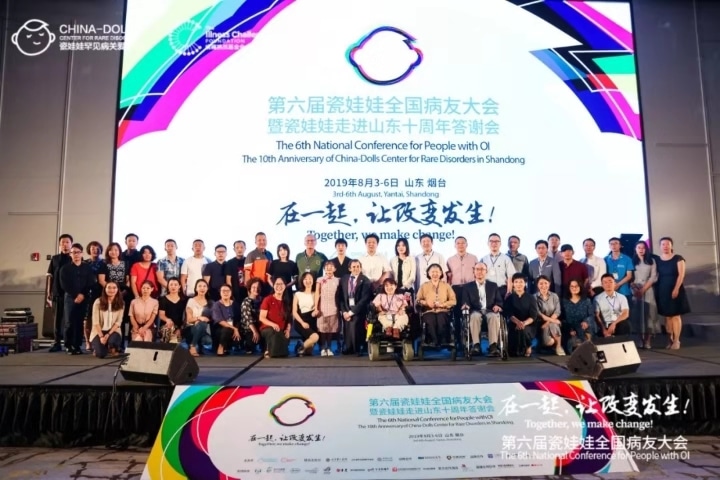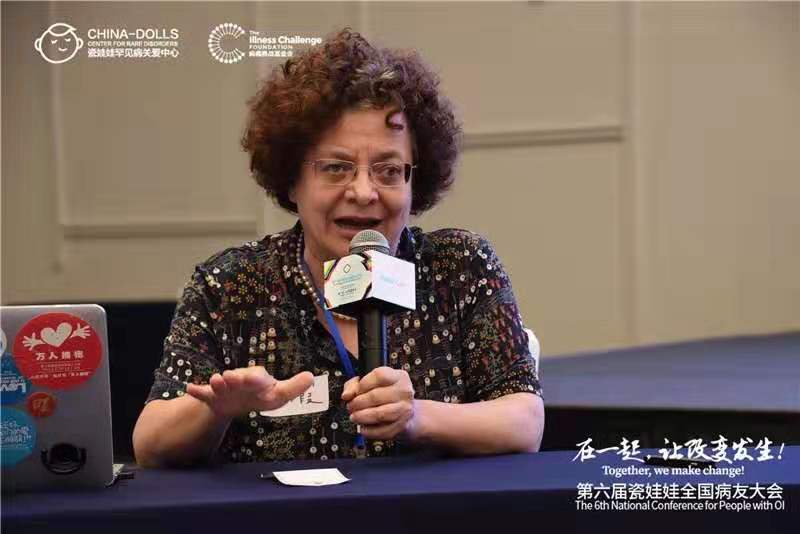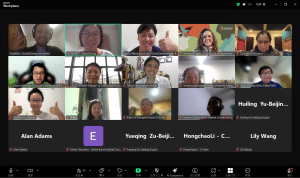
The 6th China Osteogenesis Imperfecta Conference was held in Yantai, Shandong, on August 4-6, organized by the Porcelain Dolls Rare Care Center and the Sickness Challenge Foundation. The Shandong Provincial Hospital, the Shandong Rare Disease Control Association and Yantaishan Hospital jointly sponsored the event, which was attended by more than 100 patients with the rare condition (also known as brittle bone disease) and their families, and hundreds more from among the government, medical experts, business representatives, media and the general public.
During the “Multidisciplinary Diagnosis and Treatment and Medical Resource Forum”, held on the first day, Chinese and international experts gave lectures on the treatment, rehabilitation, genetics and psychological care of people with rare bone diseases.
Wang Yanzhou, chief physician of the pediatric orthopedics of Shandong Provincial Hospital, systematically introduced the comprehensive treatment of children with osteogenesis imperfecta, especially the precautions needed after a fracture, so that parents are not too anxious; the director of the Department of Children’s Rare Skeletal Diseases of the University of Cologne, Dr. Oliver Semler, spoke about “Progress in Global Drug Therapies”. Dr. Semler has osteogenesis imperfecta himself, and he shared his experience in the application of osteogenesis imperfecta drugs in Germany over the last 25 years.
The family of osteogenesis imperfecta sufferers tend to pay the most attention to the bone deformities in the limbs of the sufferer, and neglect the care of other parts of the body. Paolo Fraschini, Professor of Rehabilitation Medicine at the University of Milan, Italy, gave a talk entitled “Lifelong Disease Management for Patients with Osteogenesis Insufficiency”, reminding everyone to pay attention to breathing, eating and sleep management, and especially to guard against the possibility of obesity and ensure a higher quality of life. Sun Lijia, counsellor and director of the service center at the Disabled Service Center, spoke on the theme of “Psychological Support for Children and Families with Osteogenesis Insufficiency” and called on the family of sufferers to pay attention to their psychological state and to their emotions and moods.
For sufferers of rare bone diseases, disability is often unavoidable. Allowing them to smoothly receive an education, realize their independence and actively integrate into society is particularly important. A series of workshops at the conference attempted to respond to this issue. Children with rare bone diseases tend to enter school and society late, and sometimes do not leave the house for long periods. Social experience is often very scarce, further affecting their self-awareness, gender cognition, and experience of marriage and love. Wang Longzhen, from Mary Stopes International’s Beijing Office, used many cases and stories to help the audience come to terms with issues of gender and gain knowledge and experience on privacy protection and emotional development.
On the 5th of August there were further workshops on education. Among the speakers was Monica Mongodi from OVCI – la Nostra Famiglia, an Italian NGO that works with disabled children and has been present in China for years. Mrs. Mongodi, an expert on rehabilitation, spoke about Italy’s policies of support for sufferers of bone diseases and the disabled.

Monica Mongodi from Italian charity OVCI – la Nostra Famiglia talks during the conference.
The national osteogenesis imperfecta conference his held biannually, and this was the first time for Yantai to play host. The conference can be considered to have been successful in increasing awareness of this rare disease, attracting the support of Chinese and international experts and partners, and setting up a good basis for the coming decade.
As the official account of the organizers puts it, “the biggest feature of this project is “participation”, “autonomy” and “mutual assistance”. It is not simply a project to aid a vulnerable group in the traditional sense. It is an innovative model of charity of a kind rarely seen in China. We hope to establish a national network of mutual assistance and information exchange for the families of patients with brittle bone disease through the conference of patients; improve the awareness of public participation of groups with diseases in China and enhance their discourse power; and advocate the government and society’s care and understanding towards people with brittle bone disease”.



